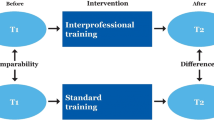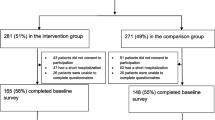Abstract
Objective
National policy makers and psychiatric educators have established the goals of teaching and promoting interdisciplinary care as high priorities. This article describes the implementation of an interprofessional seminar for which the dual aims were to provide a knowledge base for treating individuals with serious mental illness and to teach how to work collaboratively with other disciplines.
Method
A seminar, the “Treatment of chronic or recurrent mental illness: recovery, rehabilitation and interdisciplinary collaboration,” was developed in an academic community mental health center. Pre- and postseminar surveys were administered in order to test the hypothesis that the seminar would have a positive impact on trainees’ attitudes about working with the seriously mentally ill and within an interdisciplinary team. A combination of 5-point Likert scales and open-ended questions were used to gather the data. Paired samples t tests were conducted to test for significant differences between the pre- and postmeasures.
Results
The seminar participants included 24 students from psychiatry, nursing, social work, and psychology with a wide range of experience. Complete pre- and postseminar data were obtained from 14 participants. Although participants valued the seminar experience, they reported that the actual interdisciplinary work with the seriously mentally ill was less gratifying than expected. They described several advantages and challenges of care-oriented collaboration and shared learning.
Conclusion
Bringing together a diverse group of graduate and postgraduate trainees to learn together and to learn about each other’s disciplines appeared to be a successful venture, but the authors were not able to detect a positive impact on their actual work life during the course of the year. Further development of strategies to inspire professionals to engage in and promote interdisciplinary care of the seriously mentally ill is needed.
Similar content being viewed by others
References
President’s New Freedom Commission on Mental Health: Achieving the Promise: Transforming Mental Health Care in America (SMA-03-3832). Rockville, Md., U.S. Department of Mental Health and Human Services, 2003
DeGraw C, Fagan M, Parrott M, et al: Interdisciplinary education and training of professionals caring for persons with disabilities: current approaches and implications for a changing health care system. Rockville, Md., U.S. Department of Health and Human Services, 1996
Barnes D, Carpenter J, Dickinson C: Interprofessional education for community mental health: attitudes to community care and professional stereotypes. Soc Work Education 2000; 19: 565–583
Hean S, Clark JM, Adams K, et al: Will opposites attract? Similarities and differences in students’ perceptions of the stereotype profiles of other health and social care professional groups. J Interprofessional Care 2006; 20: 162–181
Hoge MA, Huey LY, O’Connell MJ: Best practices in behavioral health workforce education and training. Adm Policy Ment Health 2004; 32: 91–106
Hoge MA, Jacobs SC, Belitsky R, et al: Graduate education and training for contemporary behavioral health practice. Adm Policy Ment Health 2002; 29: 335–357
Hoge MA, Stayner D, Davidson L: Psychology internships in the treatment of severe mental illness: implications for training in academic medical centers. J Clin Psychol Med Settings 2000; 7: 213–222
Liberman RP, Hilty DM, Drake RE, et al: Requirements for multidisciplinary teamwork in psychiatric rehabilitation. Psychiatr Services 2001; 52: 1331–1342
Yedida MJ, Gillespie CC, Bernstein CA: A survey of psychiatric residency directors on current priorities and preparation for public-sector care. Psychiatr Services 2006; 57: 238–243
Zwarenstein M, Reeves S, Barr H, et al: Interprofessional education: effects on professional practice and health care outcomes (review). The Cochrane Database of Systematic Reviews 2000, Issue 3
Reeves S: A systematic review of the effects of interprofessional education on staff involved in the care of adults with mental health problems. J Psychiatr Ment Health Nursing 2001; 8: 533–542
Author information
Authors and Affiliations
Corresponding author
Rights and permissions
About this article
Cite this article
Steiner, J.L., Ponce, A.N., Styron, T. et al. Teaching an Interdisciplinary Approach to the Treatment of Chronic Mental Illness: Challenges and Rewards. Acad Psychiatry 32, 255–258 (2008). https://doi.org/10.1176/appi.ap.32.3.255
Received:
Revised:
Accepted:
Published:
Issue Date:
DOI: https://doi.org/10.1176/appi.ap.32.3.255




